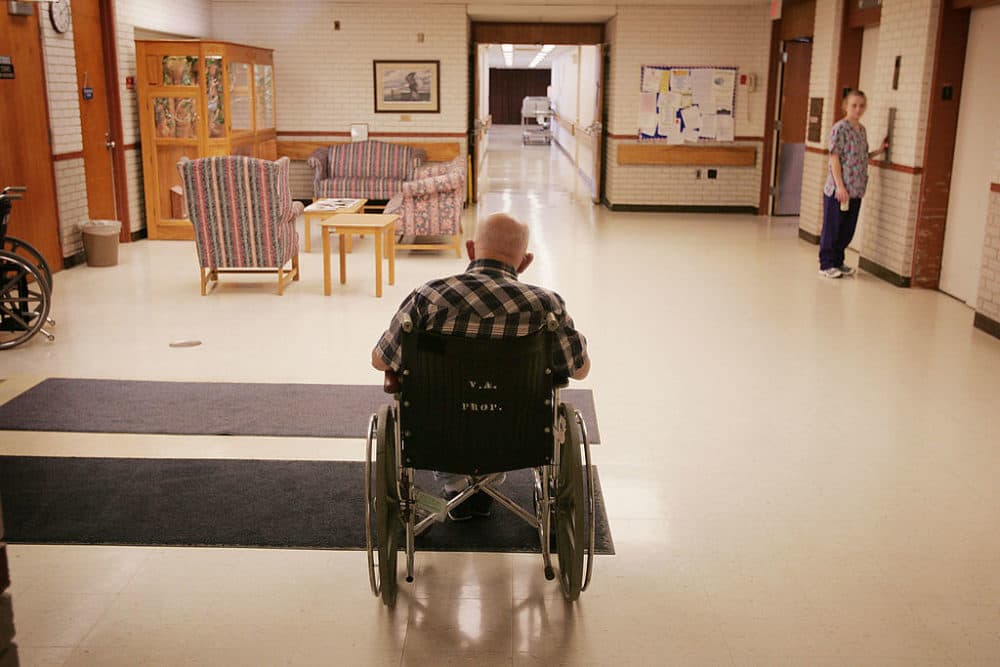Advertisement
Better Daytime Lighting Improves Sleep Quality, Reduces Depression In Alzheimer's Patients, Study Finds
Resume
Guerman Ermolenko has seen plenty of restless dementia patients. They wander the hallways of care facilities at night and wake other residents, only to sleep in late and become agitated the following evening at sundown.
“This particular patient, it’s really hard to reason with them,” says Ermolenko, a geriatric psychiatrist in the Albany, New York, area.
He tries to coax his confused patients back to sleep with his favorite interventions — chocolate, ice cream, warm milk — but they often wake up again a few hours later.
Memory loss from Alzheimer’s can evoke fear. But for many people suffering from dementia, other symptoms like poor sleep and agitation can also have a profound impact on quality of life. And Alzheimer’s patients often live in long-term care facilities, where they spend much of their time in underlit indoor spaces, says researcher Mariana Figueiro, leaving them in a state of “biological darkness.”
Her solution? More light.
‘A Cruise’ Ship Worth Of Lights
Some of Ermolenko’s patients took part in a recent clinical trial led by Figueiro, head of Rensselaer Polytechnic Institute’s Lighting Research Center. In it, researchers placed bright LEDs throughout assisted-living and long-term care facilities in New York and Vermont.
“Some clients in assisted living and dementia units, seeing all the bright lights, say they feel like they’re on a cruise,” Ermolenko says.
The study, published Friday in the Journal of Clinical Sleep, found that exposure to the light throughout the day increased sleep quality, decreased depression and lowered agitation among the seniors.
“From observations from the nurses and the caregivers, [patients] were more social,” says Figueiro. “They were eating better. They were behaving better. It was really a very amazing result.”
Figueiro and the Lighting Research Center have investigated this idea for years. They want to gather proof for their overarching thesis that tailored lighting can guide the body’s biological clock — its circadian rhythm — in ways that make people happier and healthier, reduce symptoms of certain diseases and promote recovery.
For seniors with Alzheimer’s, lighting interventions appear to give caretakers a powerful tool, if not a silver bullet, to reduce negative symptoms that often go hand-in-hand with a disease that affects more than 5 million people in the U.S.
Fixing The Biological Clock
In the study, Figueiro used circadian-lighting to keep seniors’ biological clocks in sync with the actual clock. Researchers put the bright, blue-ish lights in bedrooms and common spaces adjacent to residents’ favorite chairs and tables. The LEDs turned on automatically around the time patients woke up and switched off in the early evening to help them wind down before bed.
The seniors wore monitors to measure exposure to light. Ermolenko says the bright light disturbed a few patients, increasing their agitation, though he points out anti-depressants can have similar negative effects in some patients.
“But the vast majority of the clients, they like to have a bright environment,” he says. “Quite often what we see is that for these particular patients, they have a tendency to be more pleasant, more interactive with other clients … [and] their sleep is more sound during the nighttime.”
Participants’ scores on the Pittsburgh Sleep Quality Index showed fewer sleep disturbances. Using the Cornell Scale for Depression in Dementia, Figueiro found patients began the experiment with an average score that correlates to mild depression and ended with an average score below that threshold. Patients’ agitation scores fell too.
Figueiro used a placebo light — below the level that would affect the circadian system — as a control for the experiment. The control light provided little relief from dementia symptoms.
Seniors with Alzheimer’s are primed to assist lighting research, Figueiro says, because they’re relatively sedentary with access to limited spaces. But they’re not the only population that may benefit.
Previous research has shown that well-timed blue light could promote recovery from a mild traumatic brain injury. Figueiro says her center has retrofitted lighting for patients with TBIs at an upstate New York rehabilitation center. Figueiro also works with tailored lighting for multiple-myeloma cancer patients recovering from transplants at Mt. Sinai Hospital in New York City. Another recent study from the Lighting Research Center shows that certain lighting can even help office workers avoid an energy dip in that sleepy, post-lunch period.
The principles of all that research and its results are similar to the dementia trial, she says.
You May Need Four Times That Much Light
Figueiro laughs a little when she talks about how she wants to make the world brighter. After all, she thinks better lighting is low-hanging fruit.
“We can do a lot better than what we're doing right now in designing and implementing lighting,” she says. “We now have the technology. It's energy-efficient. So if you increase the amount of light, it's not going to hurt ... your pocket in terms of energy. And the benefits are very impressive.”
She hopes caregivers of relatives with dementia take note.
“Open up the windows, open up your shades and let daylight come,” she says. “Go outside for a walk in the morning, every day, at the same time.”
She recommends increasing the amount of light in the home by a factor of four. But don’t forget to turn the lights off in the evening — mimicking the sun.
Francesca Paris produced and edited this interview for broadcast with Kathleen McKenna. Paris also adapted it for the web.
This segment aired on December 17, 2019.

